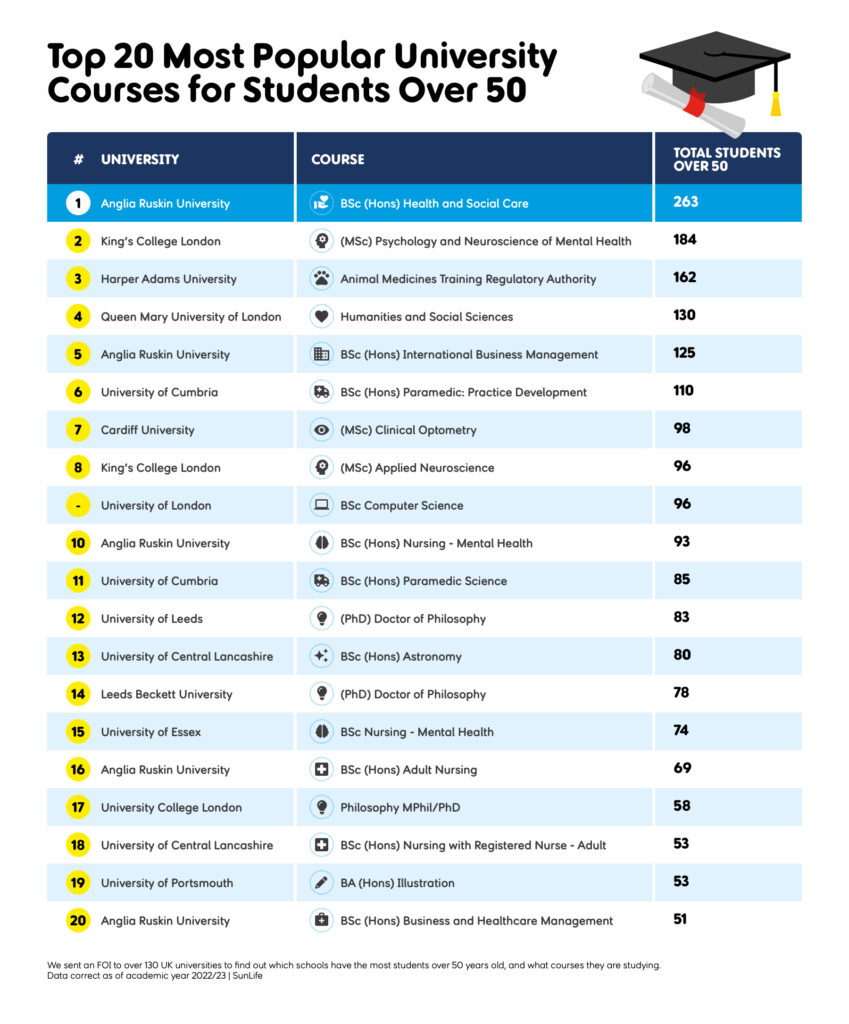Health and Social Care at Anglia Ruskin Uni, London campus, crowned most popular course for mature students (FOI)

5 tips for university as a student over 50
If you’re thinking about signing up to university as a student over 50, here are our recommendations for helping you get on track.
Share your experience
It’s important to remember that you’re not alone on this journey, and you’ve earned your place on the course. As well as friends and family, try speaking one-on-one with your lecturers to share your situation. Discuss why you have made the choice to study, and what you’re most excited about learning on the course.
A huge part of the university experience is being able to share your thoughts and challenges, and it’s likely that whatever emotions you’re feeling will resonate with your peers.
Create a dedicated study space
You don’t need to have a home office to be a successful mature student. Choose a quiet area in your home, whether that’s the kitchen table or your bedroom vanity, and set up a dedicated study space.
Not only will this help you to get into the zone, but it will also allow you to differentiate between study and free time by separating the two. This is also beneficial if you have children, as you can create house rules that prevent you from being disturbed when you’re in your study space.
Get organised
If you’re joining university as a mature student, it’s likely that you have a job, care responsibilities or other daily demands on your time. Whereas these things may not affect the typical student, it does mean your drive to succeed is likely higher.
Use your life experience to help you balance your time and create a schedule that works for you. Have a simple filing system to store your lecture notes and handouts. If it’s complicated, you won’t use it.
Plan your workload
Planning ahead can help alleviate stress as you embark on your journey as a mature student. At the start of the semester, write down any significant events on a calendar, whether that be family occasions or meetings at work.
Then, in a different colour, write down your course deadlines – ideally note them down a few days before their actual date to allow for any setbacks. Refer to your calendar on a weekly, if not daily basis.
Make the most out of lectures
The majority of university teachings take place in lectures and seminars full of students, so it’s important to know how to make the most of that time.
Before your lecture, think about what you know about the topic, and anything you’re hoping to learn. You can prepare for a lecture by reading up on it, and identifying questions you may want to ask in class.
During your lecture, it can be tempting to write down everything your teacher says – however, this can prevent you from listening properly. Instead, leave your pen on the desk and only pick it up to write down what you find most interesting or important. Usually, the presentation will be shared with you afterwards.
After your lecture, take time to think about what you’ve learnt and write a short paragraph of the main points from memory. This process will allow you to digest this new information and identify the areas where you need further reading. Don’t worry if you get stuck – you can ask your subject tutor to further explain. Remember, this is higher education and it will be difficult at times – but you’re bound to succeed if you put your mind to it.




